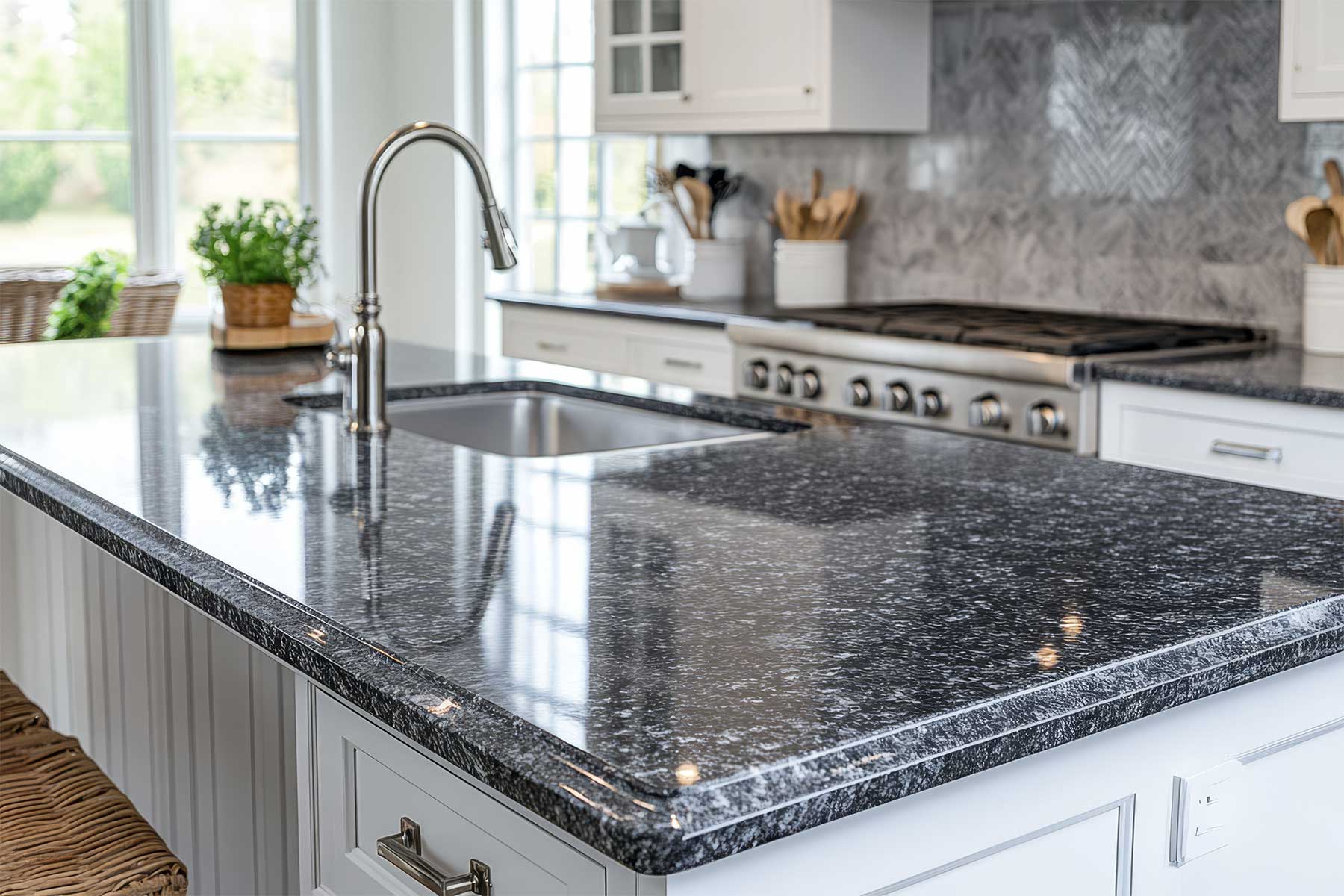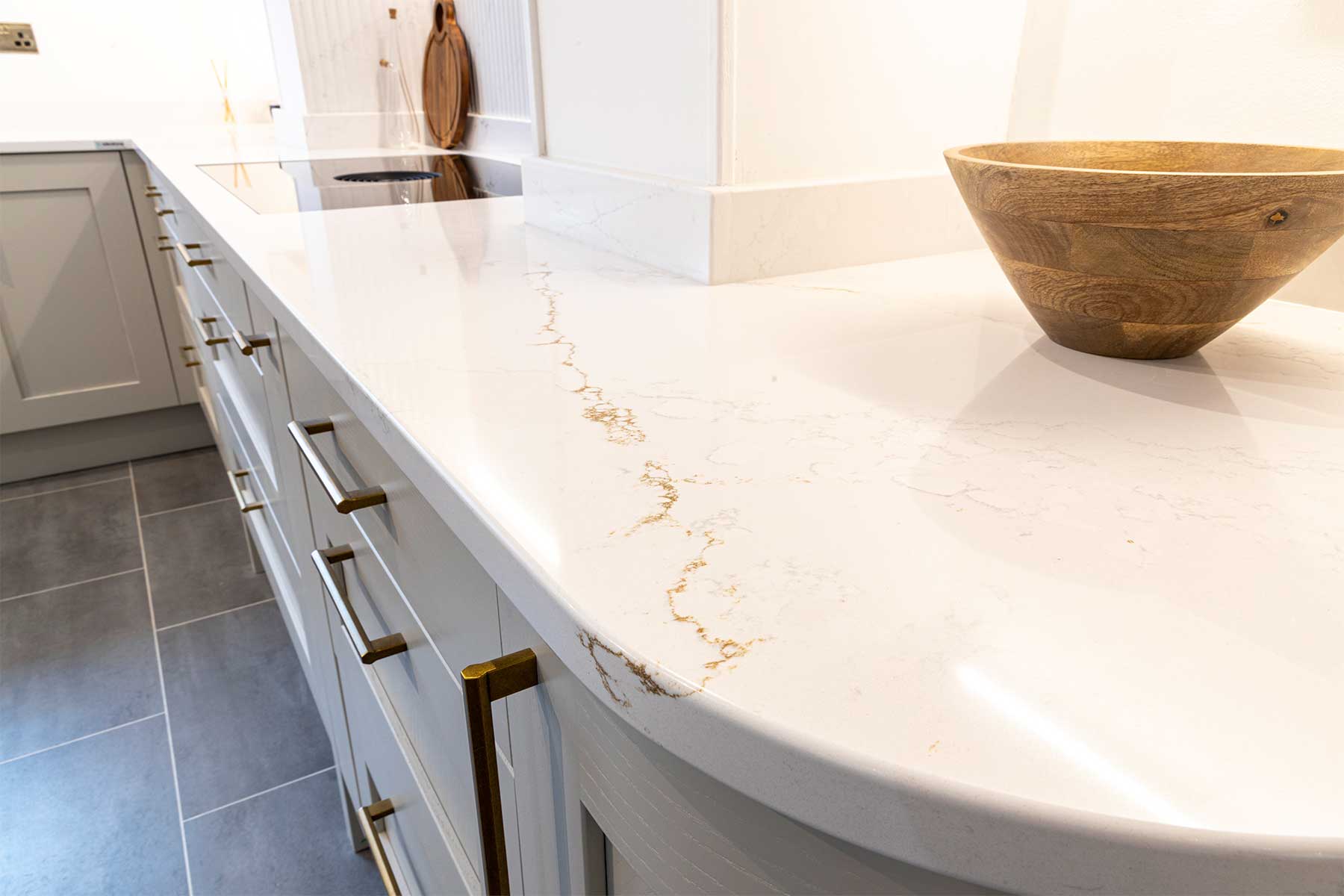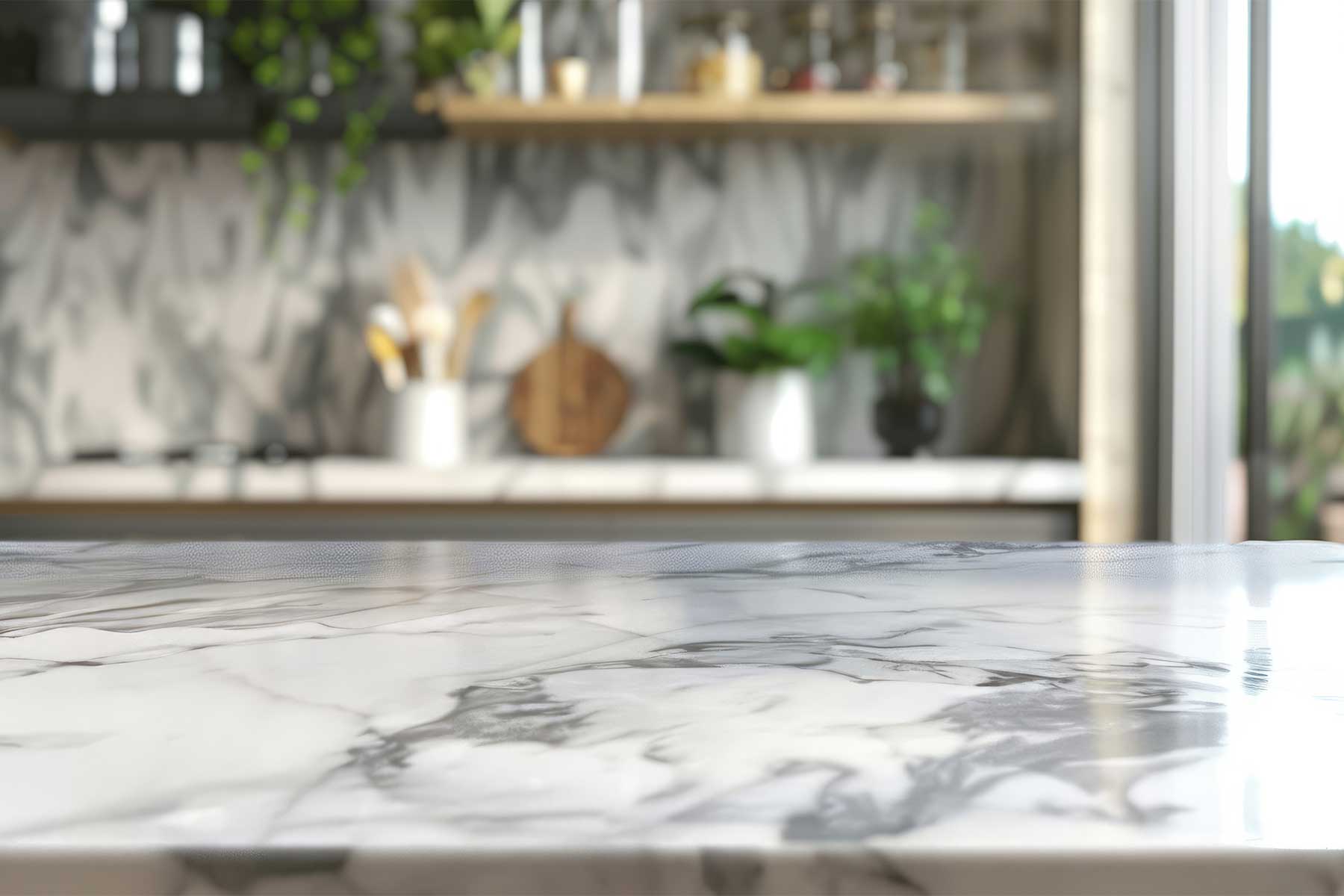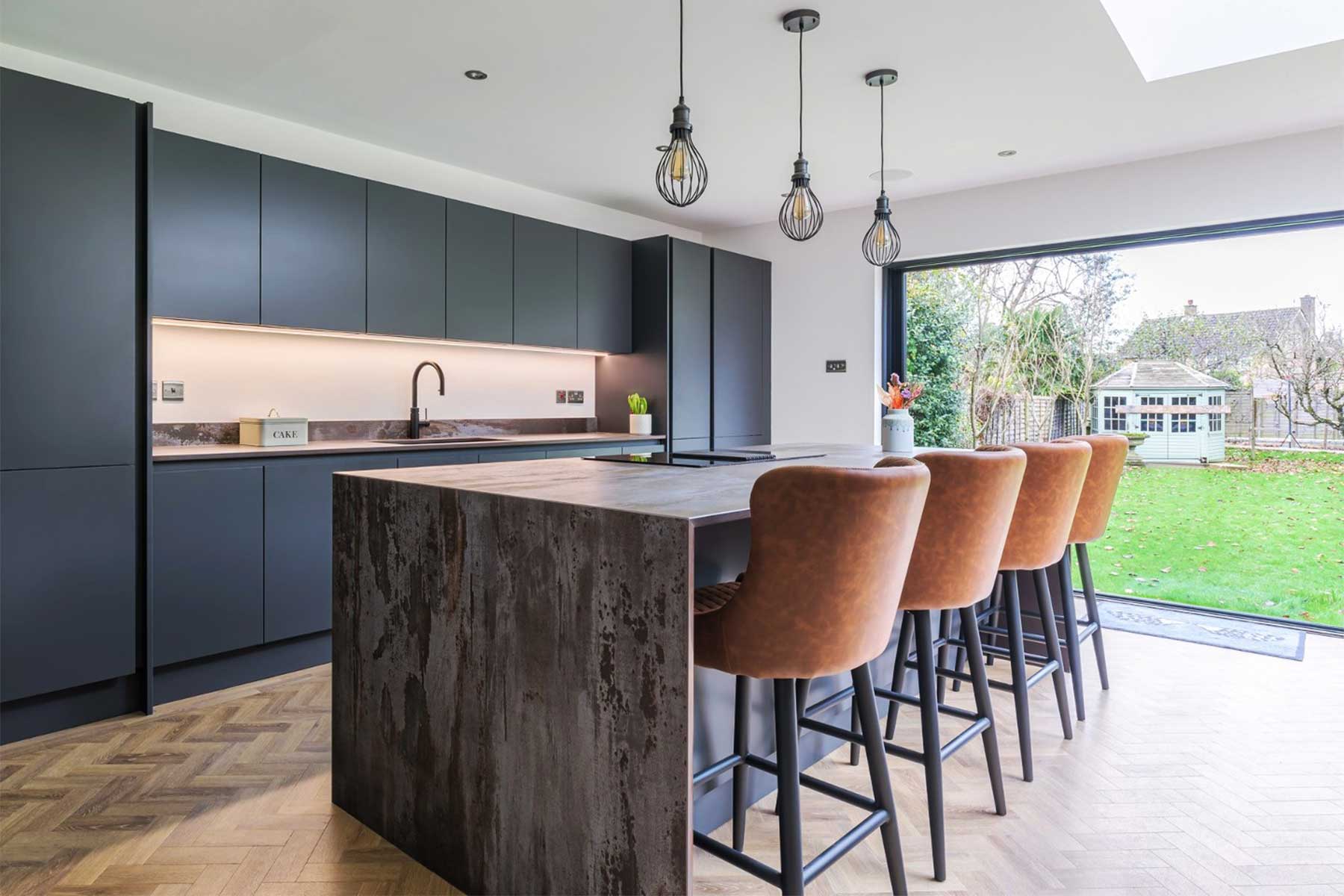STONE, CERAMIC & QUARTZ WORKTOP CLEANING & CARE GUIDE
Natural stone, quartz and ceramic worktops are highly durable and able to withstand the rigours of family life. However, they can be stained or damaged if not cleaned and maintained correctly. In this comprehensive guide our experts provide advice and best practices for natural stone, porcelain and quartz worktop cleaning and care.
Granite Worktops Cleaning and Care
All natural stone is porous to some degree. To prevent staining, and to make it easier to clean, granite worktops should be professionally sealed when manufactured. They will also need to be resealed periodically. Below are our recommendations for cleaning and long-term care of granite worktops.

How to clean granite worktops
Wipe away spills – Be mindful of spills and clean them up quickly. Although granite is one of the least porous natural stones, and well suited for use in kitchens, most natural stones are vulnerable to staining from acidic substances such as wine, citrus juices, vinegar, and salad dressings. Additionally, foods with strong artificial or natural dyes can also stain natural stone. Even sealed stone countertops can be damaged by strong acids or harsh chemicals like chlorine, bleach, or ammonia.
Cleaning methods and chemicals – Use a pH neutral detergent (pH7) to clean granite worktops. It is recommended to use a small amount of washing up liquid diluted with warm water or a specific natural stone cleaner such as HG Natural Stone Kitchen Worktop Cleaner to wash the surface. Use a microfibre cloth or soft sponge to clean the surface.
Never use abrasive or harsh cleaning chemicals as these can discolour and stain the surface, they can also damage the surface sealant. Do not use abrasive cleaning pads such as scouring or wire pads as these will scratch and dull the surface. Ensure cleaning chemicals are washed away with a clean cloth and water to avoid residue marks.
Dry and buff – To maintain the appearance of granite worktops, dry and buff the surface with paper towel or a soft microfibre cloth after cleaning to remove moisture. This will prevent water marks and smears. Particularly on dark forms of granite and other natural stones.
Maintaining granite worktops
Heat protection – Although granite worktops offer good resistance to heat, it is not advisable to leave hot pans in direct contact with the surface. Instead use insulated protectors or raised trivets, this is particularly important when using countertop cooking appliances, such as slow cookers and air fryers, that produce constant heat over long periods as these may cause cracking due to thermal shock.
Use chopping boards – Avoid chopping and cutting directly on granite surfaces and instead use chopping boards. While granite is a very hard and durable material, it can be scratched and marked by sharp and hard objects.
Reseal periodically – Granite worktops, and similar natural stone surfaces, produced by LBS Stone are sealed with a professional grade stone sealant as part of the manufacturing and finishing process. Professional stone sealants are commonly guaranteed by the manufacturer for between 5 and 15 years. However, it is recommended that granite worktops are resealed periodically, at least annually. We change the sealants we use as new and more advanced products are developed by our suppliers. Contact our sales team for advice on appropriate sealants for your granite worktops.
Avoid stress – Never stand or sit on granite countertops. Natural stone contains small fissures in the stone and excessive weight can cause cracking on rare occasions. This is not a fault with the stone, fissures are part of the structure of granite and other forms of natural stone.
Quartz Worktop Cleaning and Care
Quartz is a manmade material, a combination of ground natural stone, colour pigments and polymers. As such, quartz has low porosity, does not need to be sealed, and requires less maintenance than natural stone. While quartz is a great choice for kitchen and bathroom worktops it is not recommend for use outdoors. The following quartz worktop cleaning and maintenance advice will help to preserve the appearance of your countertops.

How to clean quartz countertops
Wipe away spills – Quartz can be stained with prolonged exposure to strong colourings, acidic liquids and food stuffs and grease. Wipe away spills quickly to prevent staining or damage to the colour pigment in quartz surfaces.
Cleaning methods and chemicals – Do not use abrasive cleaners or chemicals with high acid or alkali contents to clean quartz surfaces. Instead use warm water and a neutral cleaner (ph7) such as diluted washing up liquid or a multipurpose surface cleaner that states it is safe for natural stone and quartz worktop cleaning. Do not leave cleaning chemicals in contact with the surface for long periods of time, wash away the cleaner with clean water and a microfibre cloth.
Dry and buff – To prevent watermarks and smears, particularly with dark coloured worktops, dry quartz surfaces with paper towel and buff with a soft dry microfibre cloth.
Caring for quartz worktops
Protect from heat – Although quartz surfaces provide good heat resistance, it is still advisable to avoid exposure to high temperatures by using insulated surface protectors or raised trivets. Countertop cooking appliances, that produce constant heat for prolonged periods such as air fryers and slow cookers, should not be placed on quartz worktops and insulated or raised surface protectors should be used.
Sunlight exposure – Prolonged exposure to direct sunlight or UV light can damage the colour pigment in quartz surfaces. Therefore, quartz is not recommended for exterior use in outdoor kitchens and bars.
Use chopping boards – Always use chopping boards and never cut directly on quartz surfaces. Quartz is a robust surface perfectly suited to the everyday rigours of busy family kitchens, but cutting or chopping directly on the surface is likely to scratch it.
Do not seal – Do not apply sealants to quartz worktops and surfaces. Quartz is non-porous and does not require sealing. The sealant will sit on top of the surface, collecting dirt, dulling the surface and may be difficult to clean off.
Marble Worktop Cleaning and Care
While perfectly suitable for use as a kitchen or bathroom worktops, marble is the generally the most delicate type of natural stone. The key to maintaining the appearance of marble countertops is prevention. Here are some expert tips and recommendations for marble worktop cleaning and care.

How to clean marble worktops
Wipe away spills – Wipe away spills quickly to avoid staining. Marble can be particularly vulnerable to staining from liquid and food colourings, and substances with a high acid or alkali content. In bathrooms, toothpaste, makeup, fragrances and similar substances can also stain marble vanity tops, and spills should be wiped away quickly.
Cleaning methods and chemicals – Only use neutral (ph7) cleaning products on marble, strong cleaning will stain the surface. It is strongly advised to use a specifically formulated cleaner for marble surfaces such as HG Natural Stone Worktop Cleaner.
Never use abrasive cleaning cloths or scouring pads as these are likely to scratch or dull the surface of the marble. Use a soft microfibre cloth clean marble and ensure any cleaning chemicals or soap are rinsed away with clean water and a soft cloth.
Dry and buff – To prevent water marks and smears, dry marble with paper towel and buff the surface with a soft microfibre cloth after cleaning.
Caring for marble worktops
Protect from heat – Marble, like most forms of natural stone, has some resistant to heat, however it is not advisable to leave hot pans or other items in contact with the surface. Insulated protectors or raised trivets should be used to protect the surface. This is of particular importance when using countertop cooking appliances such as slow cookers and air fryers that produce constant heat over long periods. Prolonged exposure to heat can crack marble worktops due to thermal shock, expansion of the structure due to natural fissures in the stone.
*Fissures are a naturally occurring feature of natural stone and are not faults or defects.
Use chopping boards – Never cut or chop directly on marble worktops, this will scratch and damage the surface. Use chopping bards to protect your marble surfaces.
Avoid stress – Never stand or sit on marble counters. Marble, like all natural stone, has small fissures in the stone and excessive weight may crack the stone. This is not a fault with the stone, fissures are a natural feature of all forms of natural stone.
Reseal regularly – LBS Stone seal marble worktops and surfaces as part of our manufacturing process. We use professional grade sealants, commonly guaranteed by the manufacturers for between 5 and 15 years. However, general use of your marble surfaces will gradually deteriorate the surface protection provided by the sealant. Therefore, it is recommended that marble surfaces are resealed every 6 months to maintain surface protection.
NOTE: We periodically change the sealants we use as new and more advanced products are developed by our suppliers. Contact our sales team for advice on the correct sealant for your marble worktops.
Ceramic and Porcelain Worktop Cleaning and Care
Porcelain and ceramic surfaces are the most durable materials for kitchen and bathroom worktops. Their very low porosity makes them highly resistant to staining. Porcelain surfaces such as Dekton, are also extremely hard which also makes them highly resistant to heat and scratching. Like quartz worktop cleaning, porcelain and ceramic worktops are easy to maintain. Here we detail some experts advice for cleaning and caring for porcelain and ceramic surfaces.

How to clean ceramic and porcelain worktops
Wipe away spills – Being very dense, with very low porosity, ceramic and particularly porcelain worktops are highly resistant to staining. It is however still advisable to wipe away food and liquid spills to avoid substances drying on your worktops as they will be more difficult to remove. Stain and scratch resistance properties of porcelain and ceramic surfaces vary slightly by brand and material, therefore it is advisable to read the manufacturers usage and care guidelines for your chosen surface material.
Cleaning methods and chemicals – As with natural stone and quartz, strong and abrasive cleaning chemicals should be avoided. Plastic and metal souring pads should be avoided as these may scratch or dull the surface. Clean surfaces with warm water and diluted washing up liquid or a neutral (pH7) surface cleaner, ensuring that soap and chemicals are rinsed away with warm water and clean cloth.
Dry and buff – Dry porcelain and ceramic worktops with paper towel and then buff with a soft, dry microfibre cloth to remove water marks and hazing. This will keep surfaces free from water marks and maintain their appearance.
Caring for ceramic and porcelain worktops
Protect from heat – Porcelain worktops are resistant to heat from hot pans. Many ceramic worktops also provide a high degree of heat resistance, but as materials differ, it is advisable to check with the manufacturer’s guidance regarding heat resistance and care.
When using countertop cooking appliances that produce a constant heat for long periods, such as air fryers and slow cookers, insulated surface protectors or raised trivets should be used to protect the surface from thermal shock. This is the build up of heat over long periods that may in rare occurrences cause the surface to crack.
Use chopping boards – Although porcelain and ceramic surfaces are generally the hardest and most durable of worktop materials, it is still advisable to use boards for chopping and cutting to avoid scratches.
Avoid impacts – Porcelain and ceramic surfaces are very hard, but they can be chipped or cracked by heavy impacts from hard objects such as meat tenderisers. Edges of worktops can be particularly vulnerable to heavy impacts. Chips can sometimes be repaired in some types of porcelain and ceramic materials such as Dekton, but this is not the case for all forms of the material.
Avoid stress – Never stand or sit on porcelain and ceramic counters. Although the material is very strong and durable in everyday use, excessive weight may crack the surface. While chips can sometimes be repaired, cracks in porcelain and ceramic surfaces cannot be repaired.
Do not seal – Do not apply sealants to ceramic and porcelain worktops, they are non-porous and do not require sealing. If applied, the sealant will not be absorbed and the residue may collect dirt, dull the surface, and can be difficult to clean off.
Still Need Some Help?
If you would like specific advice about cleaning, removing marks and stains, or repairing a damaged kitchen or bathroom countertop, please contact us. Alternatively get in touch with the manufacturer of your natural stone or composite worktop, our sales team will be happy to provide you with contact details.
Affordable Marble, Granite, Quartz & Ceramic Stone Worktops. Measured, Made & Installed by LBS Stone, West Sussex. Contact us today for more information.
